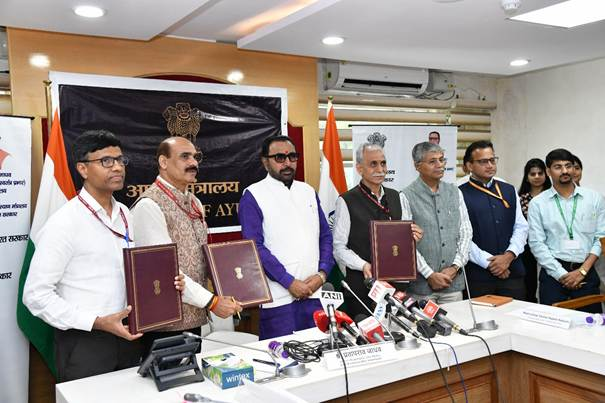India Advances Medicinal Plant Conservation with Two MoUs Signed by NMPB
The first MoU was inked between the NMPB and IshVed-Bioplants Venture, Pune, Maharashtra, a company specializing in advanced biotechnological applications for plant conservation.

- Country:
- India
In a significant step toward conserving and promoting India’s vast medicinal plant heritage, the National Medicinal Plants Board (NMPB) under the Ministry of Ayush signed two crucial Memoranda of Understanding (MoUs) today at Nirman Bhawan, New Delhi. The event was graced by the presence of Shri Prataprao Jadhav, Union Minister of State for Ayush (Independent Charge) and Minister of State for Health and Family Welfare, underscoring the government’s firm commitment to integrating traditional knowledge and modern science for a healthier and self-reliant India by 2047.
Key MoUs Foster Conservation, Innovation, and Public Awareness
The first MoU was inked between the NMPB and IshVed-Bioplants Venture, Pune, Maharashtra, a company specializing in advanced biotechnological applications for plant conservation. The second tripartite agreement was signed among NMPB, the All India Institute of Ayurveda (AIIA), and the prestigious All India Institute of Medical Sciences (AIIMS), New Delhi.
MoU 1: Conserving Rare, Endangered, and Threatened Medicinal Plants through Tissue Culture
The collaboration between NMPB and IshVed-Bioplants Venture is focused on conserving the germplasm of rare, endangered, and threatened (RET) medicinal plants by applying sophisticated tissue culture methods. Tissue culture enables the propagation of plants under controlled laboratory conditions, which is vital for preserving genetic diversity and ensuring sustainable supplies of medicinal plants critical to the Ayush industry.
This MoU aims to develop and standardize tissue culture techniques and cultivation protocols that will benefit stakeholders including farmers, researchers, and Ayurvedic manufacturers. The partnership seeks to make medicinal plants in the RET category more accessible, thereby preventing over-exploitation from the wild and supporting ecological balance.
By combining NMPB’s regulatory and policy expertise with IshVed’s technological capabilities, the two entities will work closely to enhance germplasm conservation and facilitate widespread cultivation of these valuable plants. This effort aligns with the government’s broader biodiversity conservation goals and supports the growing global demand for natural and herbal products.
MoU 2: Creating a National Medicinal Plants Garden at AIIMS to Promote Public Awareness
The second MoU brings together NMPB, AIIA, and AIIMS to establish a national-level medicinal plants garden within the AIIMS campus in New Delhi. Managed by the All India Institute of Ayurveda, this garden will serve as a living repository and educational resource designed to raise awareness among patients, healthcare professionals, students, and visitors about the importance of medicinal plants.
This initiative will not only preserve plant species but also serve as a platform for knowledge sharing and interdisciplinary collaboration. Patients who visit AIIMS from across the country will gain exposure to the therapeutic potential of medicinal plants, reinforcing the integration of traditional Ayurvedic wisdom with modern medical practices.
The garden will also become a research hub where scientists and students can study plant species and their applications, fostering innovation in herbal medicine and supporting the Ministry of Ayush’s mission to promote evidence-based practices.
Government’s Vision for a Healthier and Self-Reliant India by 2047
Speaking at the signing ceremony, Shri Prataprao Jadhav highlighted the strategic importance of these MoUs in realizing Prime Minister Narendra Modi’s vision of a healthier and self-reliant India by 2047. He emphasized the synergy between traditional knowledge systems and modern scientific approaches as a foundation for sustainable development in healthcare and biodiversity conservation.
“These MoUs represent a significant milestone in conserving and promoting India’s rich medicinal plant heritage. By integrating traditional knowledge with modern science, we are making meaningful progress toward our ambitious vision,” said Minister Jadhav.
Broader Implications for the Ayush Industry and Biodiversity
India’s medicinal plant sector is a cornerstone of the Ayush industry, which contributes significantly to the country’s economy and healthcare system. With over 7,000 plant species used in traditional medicine, conservation efforts like these ensure the sustainability of natural resources critical to this sector.
Moreover, the MoUs demonstrate India’s leadership in biodiversity conservation at a time when global ecosystems face unprecedented threats. The use of tissue culture and establishment of educational gardens set important precedents for how traditional medicine and modern biotechnology can coexist to benefit communities, industries, and the environment.
The signing of these two landmark MoUs signals a new phase in India’s efforts to preserve its medicinal plant wealth through innovative conservation techniques and public engagement. By fostering collaboration between government bodies, scientific institutions, and industry players, the Ministry of Ayush is laying the groundwork for a vibrant, sustainable, and globally competitive medicinal plants sector.
As India moves toward its 2047 vision, these initiatives will play a critical role in ensuring that the country’s natural heritage continues to support health, economic development, and ecological resilience for generations to come.
ALSO READ
Tragic Assault: 15-Year-Old Airlifted to AIIMS Delhi for Critical Care
Nursing Scandal Unfolds at AIIMS-Bhubaneswar
Crisis at AIIMS-Patna: Doctors Strike Following Confrontation with MLA
Doctors on Strike: AIIMS Patna's Healthcare Disruption Over Political Tensions
Appreciate AIIMS Deoghar for sending anti-venom drugs to remote tribal areas through drones: President Murmu in Jharkhand.










